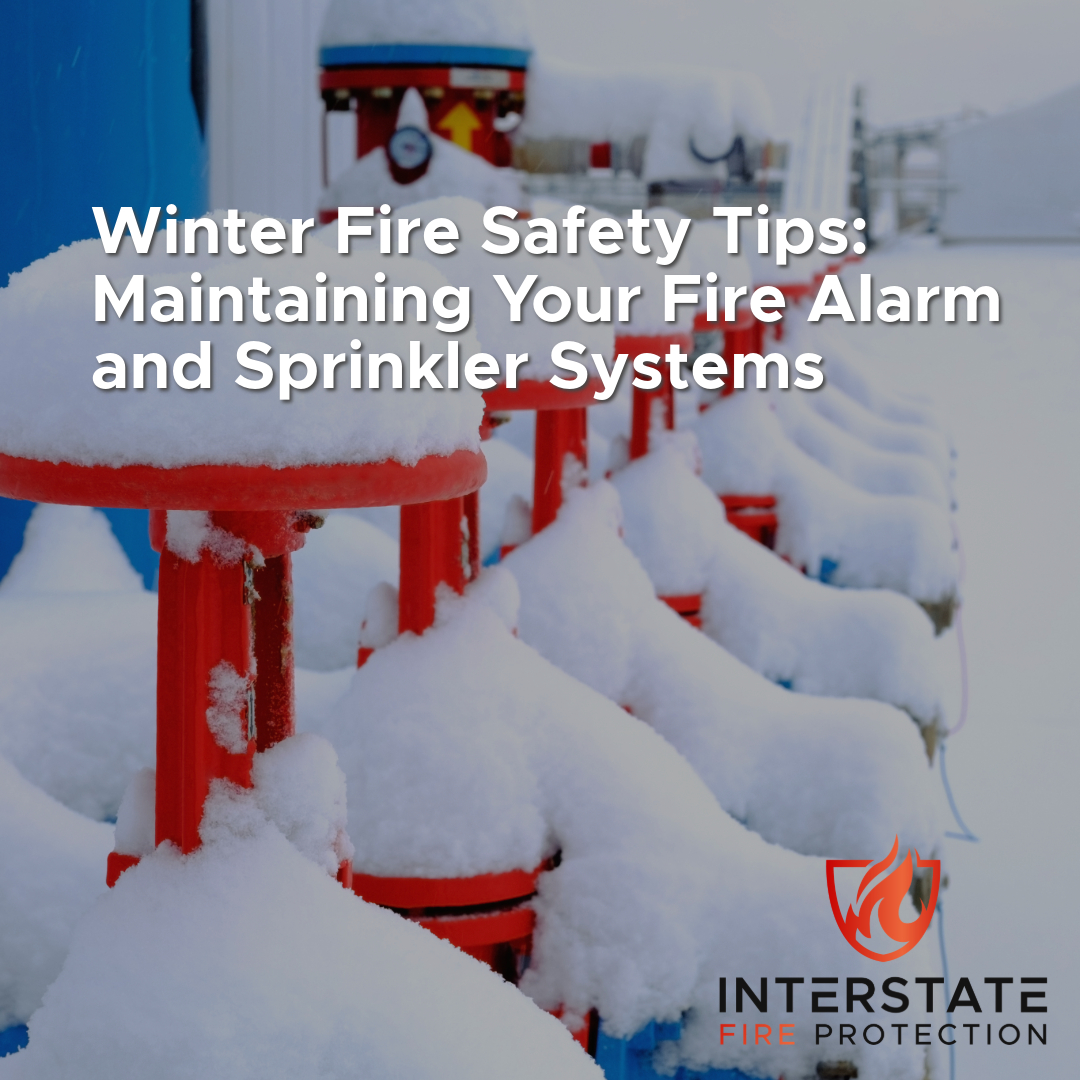
Winter introduces unique challenges for fire safety systems. Freezing temperatures, snow, and ice can compromise the functionality of fire alarms and sprinkler systems, potentially leaving your business vulnerable during an emergency. These issues can be particularly costly in winter, as the added stress on systems often coincides with increased hazards such as holiday-season activity, the use of space heaters, and fluctuating indoor-outdoor temperatures. By focusing on maintaining fire alarm and sprinkler systems in winter, you can ensure reliable protection for your property, assets, and employees. At Interstate Fire, we provide expert services and practical tips to help your systems withstand the challenges of the colder months.
Maintaining Fire Alarm and Sprinkler Systems in Winter
Cold weather can significantly impact fire protection systems in several ways:
- Frozen Pipes – Uninsulated sprinkler pipes are highly susceptible to freezing, rendering the system ineffective just when it’s needed most. Even a minor freeze can cause blockages that prevent water from flowing, putting your entire building at risk.
- Battery Drain – Extreme cold can shorten the lifespan of batteries in fire alarm systems, reducing their reliability. Without regular checks, your alarms could fail to detect smoke or fire in time.
- Obstructed Equipment – Snow and ice can block access to critical components such as hydrants, sprinkler heads, and fire exits. This not only impedes emergency response but can also cause physical damage to equipment.
- Increased Heating Use – Heaters and boilers, essential during winter, can sometimes introduce additional fire hazards. A malfunctioning or poorly maintained heater could become the source of a fire.
- Power Outages – Winter storms often cause power outages, and without backup power, fire safety systems may fail. Ensuring battery backups and generators are operational is key to uninterrupted safety.
Steps to Maintain Fire Alarms and Sprinkler Systems in Winter
Proactive maintenance is essential to avoid these risks. Here are some key actions to ensure your systems perform effectively throughout the winter season:
- Inspect and Insulate Pipes – Ensure that all sprinkler pipes are insulated to prevent freezing. For facilities in extremely cold climates, consider using dry pipe sprinkler systems. These systems remain free of water until they are activated, eliminating the risk of freezing.
- Test Fire Alarms Regularly – Regular testing of fire alarm systems, including batteries, sensors, and communication lines, ensures that they are functioning correctly. Replace weak or failing batteries before they cause problems.
- Clear Snow and Ice – Make it a priority to keep fire safety equipment accessible. Clear snow and ice from access points, hydrants, and sprinkler heads to ensure they can operate without obstruction during an emergency.
- Schedule Professional Maintenance – Working with a certified fire protection provider, such as Interstate Fire, can make a significant difference. Seasonal maintenance should include checking pressure levels in sprinkler systems, testing fire alarms, and inspecting components for wear or damage.
- Monitor for Power Outages – Backup batteries and generators must be ready to power fire safety systems during outages. Perform regular checks to ensure they are in working order.
Common Winter Fire Safety Challenges and How to Overcome Them
Understanding common winter-specific issues can help you prepare better:
- Unheated Areas – Facilities with unheated sections, such as warehouses or garages, are more prone to freezing pipes. Installing antifreeze loops or heaters in these areas can help maintain system integrity.
- Condensation Buildup – Rapid temperature changes can cause condensation inside fire safety equipment, leading to rust or malfunction. Regular inspections can identify and address these issues before they escalate.
- Portable Heaters – While convenient, portable heaters are a leading cause of winter fires. Always place heaters at least three feet away from flammable materials and ensure they are equipped with automatic shut-off features.
- Holiday Decorations and Increased Foot Traffic – Businesses often see a rise in decorations and activity during winter holidays. Ensure that decorations do not obstruct fire equipment or exits and conduct safety drills to familiarize employees with emergency procedures.
Tips for Employee Fire Safety Awareness in Winter
In addition to system maintenance, employee training plays a crucial role in fire safety. Educate your team on:
- Proper use of space heaters and electrical equipment.
- Recognizing the signs of system malfunctions.
- Following updated evacuation plans tailored for winter conditions.
- Regular safety drills not only reinforce these practices but also build confidence in your employees’ ability to respond effectively in an emergency.
Protect Your Business This Winter
Winter doesn’t have to mean increased risk for your business. By prioritizing maintenance, you can ensure that your fire safety systems perform reliably even in the harshest conditions. Don’t let winter hazards catch you off guard—start preparing today.